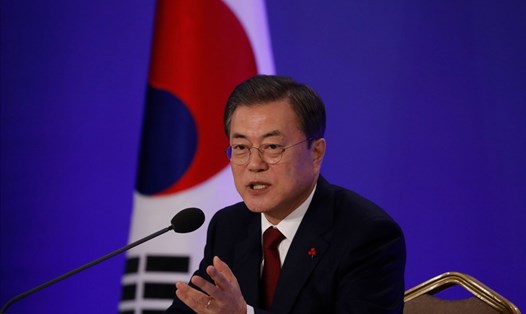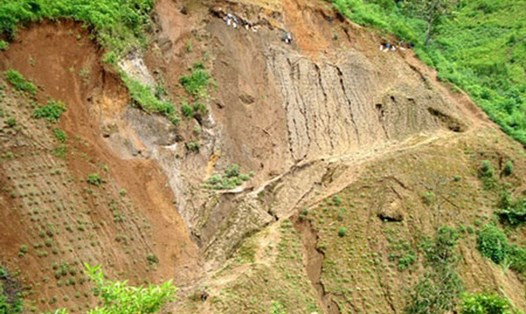Dependence on China
The vonfram mine (or tungsten) in Sangdong, 180km southeast of Seoul, is being revived to extract the precious metal of the digital age, in technologies from phones, chips to electric vehicles and missiles.
Many countries consider minerals a national security issue as China controls the exploitation, processing or refining of many types of minerals.
Asian Thanh Hoa is the largest important mineral supplier to the US and Europe, according to research by the China Geological Survey in 2019. Of the 35 minerals that the US classifies as important, China is the largest supplier of 13 minerals, including rare earth elements needed for clean energy technology. China is the largest supplier of 21 important minerals to the European Union, such as antimon used in batteries.
In an important raw material restaurant, China is sitting with dessert and the rest of the world is sitting on a taxi reading the menu, Julian Kettle, senior vice president of metals and mining at consulting firm Wood MacKenzie, for example.
There must be a plan B
Special potential for South Korea, home to major chipmakers such as Samsung Electronics. South Korea is the world's largest consumer of vonfram per capita and depends on China for up to 95% of its metal imports, which is highly appreciated for its incomparable strength and heat resistance.
According to CRU Group, the London-based commodity analyst, China controls more than 80% of global vonfram supply.
The vonfram mine in Sangdong, a city of 30,000 people and now with only 1,000 people, is one of the largest von fram mines in the world and can produce 10% of the global supply when it goes into operation from 2023, according to the mine owner.
Lewis Black, CEO of Almonty Korea, a Canada-based parent company of Almonty Industries, said the company plans to supply about half of its output to the Korean domestic market in exchange for supply from China.
"It's easy to buy from China and China is South Korea's largest trading partner, but they know they are too dependent. You have to have a plan B right now," said Lewis Black.
Vonfram in Sangdong, discovered in 1916, was a mainstay of the South Korean economy, accounting for 70% of the country's export income in the 1960s when the metal was widely used in metal cutting tools.
Sangdong mine was closed in 1994 due to cheaper mineral supply from China.
Currently, Almonty is asserting that the above demand, along with continued price increases thanks to the digital revolution and the green revolution as well as the desire for diversification of supply sources will promote exploitation in this mine.
Paratungstate's European price is 88.5%, an important raw material in vonfram products, trading around $346/ton, up more than 25% year-on-year and close to a five-year high, according to the Asian Metals Valuation Agency.
Sangdong mining is being modernized, with large underground tunnels, while the vonfram grinding plant has also started operating.
We should continue to operate this mine so that the new technology can be passed on to the next generations, said Kang Dong-hoon, a manager in Sangdong. We have been absent from the mining industry for 30 years. If we lose this opportunity, there will be no more opportunities."
Almonty Industries has signed a 15-year deal to sell vonfram to Pennsylvania-based Global Tungsten & Powders. It is a supplier to the US military and uses a lot of this metal in artillery warheads, missiles and satelliteters.
However, there is no guarantee of long-term success for the mining group investing about 100 million USD in the Sangdong project, Reuters noted. Such joint ventures may still have difficulty competing with China and some industry experts are concerned that developed countries will not comply with their commitment to diversify supply chains for key minerals.
Supply chain diplomacy
Seoul has established a special forces force for key economic security items following a supply crisis last November when Beijing tightened exports of urea compounds that many Korean diesel vehicles were forced to use to cut emissions. At that time, nearly 97% of South Korea's urea was from China, and the shortage prompted people to flock to gas stations across the country.
Korea mine Rehabilitation and Mineral Resources Corporation (KOMIR), the government agency responsible for South Korea's national resource security, said it has pledged to provide a subsidy of about 37% of Sangdong's tunnel clearance costs and will consider providing additional support to minimize any potential environmental damage.
In January, President-elect Yoon Seok-yeol pledged to reduce the dependence on minerals of "a certain country" and in April announced a new resource strategy allowing the Korean government to share reserve information with the private sector.
South Korea is not alone. The US, the European Union and Japan have all issued or updated their country's key mineral supply strategies over the past two years, making plans to expand to invest in more diverse supply lines to reduce dependence on China.
The mineral supply chain has also become a part of the diplomatic mission. Last year, Canada and the European Union launched a strategic partnership on raw materials to reduce dependence on China. Recently, South Korea signed cooperation agreements with Australia and Indonesia on the mineral supply chain.
Supply chain delivery will be a priority for many governments in the coming years as access to raw materials that are important for digital and green transformation has become a top priority, said Henning Gloystein, Director of Energy and Climate at Eurasia Group.
In November, China's leading economic planner said it would step up exploration of strategic mineral resources including rare earth, vonfram and copper.










